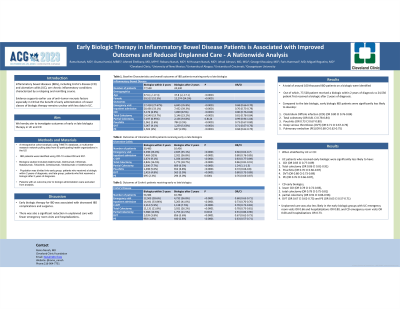Tuesday Poster Session
Category: IBD
P3590 - Early Biologic Therapy in Inflammatory Bowel Disease Patients Is Associated With Improved Outcomes and Reduced Unplanned Care - A Nationwide Analysis
Tuesday, October 24, 2023
10:30 AM - 4:00 PM PT
Location: Exhibit Hall


Rama Nanah, MD
Cleveland Clinic
Cleveland, OH
Presenting Author(s)
Rama Nanah, MD1, Osama Hamid, MBBS1, Ahmed Eltelbany, MD, MPH1, Robana Nanah, MD2, M Housam Nanah, MD1, Jehad Almasri, MD, MSc3, George Khoudary, MD4, Faris Hammad, MD5, Miguel Regueiro, MD6
1Cleveland Clinic, Cleveland, OH; 2University of Aleppo, Cleveland, OH; 3University of Cincinnati, Cincinnati, OH; 4Georgetown University, Washington, DC; 5Case Western Reserve University School of Medicine, Cleveland, OH; 6Cleveland Clinic Lerner College of Medicine, Case Western Reserve University, Cleveland, OH
Introduction: Inflammatory bowel diseases (IBDs), including Crohn’s disease (CD) and ulcerative colitis (UC), are chronic inflammatory conditions characterized by a relapsing and remitting course. Evidence supports earlier use of anti–tumor necrosis factors especially in CD but the benefit of early administration of newer classes of biologic therapy remains unclear with less data in UC.
Methods: TriNETX, a multicenter research network pulling data from 80 participating health organizations in the US was analyzed. IBD patients were identified using ICD-10 codes K50 and K51. Biologics studied included Adalimumab, Golimumab, Infliximab, Natalizumab, Tofacitinib, Certolizumab, Vedolizumab or Ustekinumab. Population was divided into early group; patients who received a biologic within 2 years of diagnosis, and late group; patients who first received a biologic after 2 years of diagnosis. Patients with an outcome prior to biologic administration were excluded from analysis.
Results: A total of 102,058 IBD patients on a biologic were identified. Out of which, 77,528 patients received a biologic within 2 years of diagnosis vs 24,530 patient first received a biologic after 2 years of diagnosis. Compared to the late biologic, early biologic IBD patients were significantly less likely to develop Clostridium Difficile infection (CDI) (OR 0.80 CI 0.76-0.84), total colectomy (OR 0.81 CI 0.78-0.84), pouchitis (OR 0.73 CI 0.67-0.80), deep venous thrombosis (DVT) (OR 0.71 CI 0.67-0.76) and Pulmonary embolism (PE) (OR 0.68 CI 0.62-0.75). When stratified by UC or CD, the results were similar: UC patients who received early biologic were significantly less likely to have CDI (OR 0.83 CI 0.77-0.89), total colectomy (OR 0.86 CI 0.81-0.91), pouchitis (OR 0.76 CI 0.66-0.87), DVT (OR 0.80 CI 0.73-0.89) and PE (OR 0.76 CI 0.66-0.87), and CD early biologics, lower CDI (OR 0.78 CI 0.72-0.83), total colectomy (OR 0.78 CI 0.75-0.81), partial colectomy (OR 0.91 CI 0.86-0.96), DVT (OR 0.67 CI 0.62-0.73) and PE (OR 0.63 CI 0.57-0.71). Unplanned care was also less likely in the early biologic groups with UC emergency room visits OR 0.66 and hospitalizations OR 0.80, and CD emergency room visits OR 0.68 and hospitalizations OR 0.73.
Discussion: Early biologic therapy for IBD was associated with decreased IBD complications and surgeries. There was also a significant reduction in unplanned care with fewer emergency room visits and hospitalizations.
Disclosures:
Rama Nanah, MD1, Osama Hamid, MBBS1, Ahmed Eltelbany, MD, MPH1, Robana Nanah, MD2, M Housam Nanah, MD1, Jehad Almasri, MD, MSc3, George Khoudary, MD4, Faris Hammad, MD5, Miguel Regueiro, MD6. P3590 - Early Biologic Therapy in Inflammatory Bowel Disease Patients Is Associated With Improved Outcomes and Reduced Unplanned Care - A Nationwide Analysis, ACG 2023 Annual Scientific Meeting Abstracts. Vancouver, BC, Canada: American College of Gastroenterology.
1Cleveland Clinic, Cleveland, OH; 2University of Aleppo, Cleveland, OH; 3University of Cincinnati, Cincinnati, OH; 4Georgetown University, Washington, DC; 5Case Western Reserve University School of Medicine, Cleveland, OH; 6Cleveland Clinic Lerner College of Medicine, Case Western Reserve University, Cleveland, OH
Introduction: Inflammatory bowel diseases (IBDs), including Crohn’s disease (CD) and ulcerative colitis (UC), are chronic inflammatory conditions characterized by a relapsing and remitting course. Evidence supports earlier use of anti–tumor necrosis factors especially in CD but the benefit of early administration of newer classes of biologic therapy remains unclear with less data in UC.
Methods: TriNETX, a multicenter research network pulling data from 80 participating health organizations in the US was analyzed. IBD patients were identified using ICD-10 codes K50 and K51. Biologics studied included Adalimumab, Golimumab, Infliximab, Natalizumab, Tofacitinib, Certolizumab, Vedolizumab or Ustekinumab. Population was divided into early group; patients who received a biologic within 2 years of diagnosis, and late group; patients who first received a biologic after 2 years of diagnosis. Patients with an outcome prior to biologic administration were excluded from analysis.
Results: A total of 102,058 IBD patients on a biologic were identified. Out of which, 77,528 patients received a biologic within 2 years of diagnosis vs 24,530 patient first received a biologic after 2 years of diagnosis. Compared to the late biologic, early biologic IBD patients were significantly less likely to develop Clostridium Difficile infection (CDI) (OR 0.80 CI 0.76-0.84), total colectomy (OR 0.81 CI 0.78-0.84), pouchitis (OR 0.73 CI 0.67-0.80), deep venous thrombosis (DVT) (OR 0.71 CI 0.67-0.76) and Pulmonary embolism (PE) (OR 0.68 CI 0.62-0.75). When stratified by UC or CD, the results were similar: UC patients who received early biologic were significantly less likely to have CDI (OR 0.83 CI 0.77-0.89), total colectomy (OR 0.86 CI 0.81-0.91), pouchitis (OR 0.76 CI 0.66-0.87), DVT (OR 0.80 CI 0.73-0.89) and PE (OR 0.76 CI 0.66-0.87), and CD early biologics, lower CDI (OR 0.78 CI 0.72-0.83), total colectomy (OR 0.78 CI 0.75-0.81), partial colectomy (OR 0.91 CI 0.86-0.96), DVT (OR 0.67 CI 0.62-0.73) and PE (OR 0.63 CI 0.57-0.71). Unplanned care was also less likely in the early biologic groups with UC emergency room visits OR 0.66 and hospitalizations OR 0.80, and CD emergency room visits OR 0.68 and hospitalizations OR 0.73.
Discussion: Early biologic therapy for IBD was associated with decreased IBD complications and surgeries. There was also a significant reduction in unplanned care with fewer emergency room visits and hospitalizations.
Disclosures:
Rama Nanah indicated no relevant financial relationships.
Osama Hamid indicated no relevant financial relationships.
Ahmed Eltelbany indicated no relevant financial relationships.
Robana Nanah indicated no relevant financial relationships.
M Housam Nanah indicated no relevant financial relationships.
Jehad Almasri indicated no relevant financial relationships.
George Khoudary indicated no relevant financial relationships.
Faris Hammad indicated no relevant financial relationships.
Miguel Regueiro: AbbVie – Advisory Committee/Board Member, Consultant, Unrestricted educational grants. Alfasigma – Advisory Committee/Board Member, Consultant. Allergan – Advisory Committee/Board Member, Consultant. Amgen – Advisory Committee/Board Member, Consultant. Bristol Myers Squibb – Advisory Committee/Board Member, Consultant, Unrestricted educational grants. Celgene – Advisory Committee/Board Member, Consultant, Unrestricted educational grants. Eli Lilly – Advisory Committee/Board Member, Consultant. Genentech – Advisory Committee/Board Member, Consultant, Unrestricted educational grants. Gilead Sciences – Advisory Committee/Board Member, Consultant, Unrestricted educational grants. Janssen – Advisory Committee/Board Member, Consultant, Unrestricted educational grants. Miraca Labs – Advisory Committee/Board Member, Consultant. Pfizer Inc – Advisory Committee/Board Member, Consultant, Unrestricted educational grants. Prometheus – Advisory Committee/Board Member, Consultant. Salix – Advisory Committee/Board Member, Consultant. Seres – Advisory Committee/Board Member, Consultant. Takeda – Advisory Committee/Board Member, Consultant, Unrestricted educational grants. Target RWE – Advisory Committee/Board Member, Consultant. UCB – Advisory Committee/Board Member, Consultant, Unrestricted educational grants. Wolters Kluwer Health – Royalties.
Rama Nanah, MD1, Osama Hamid, MBBS1, Ahmed Eltelbany, MD, MPH1, Robana Nanah, MD2, M Housam Nanah, MD1, Jehad Almasri, MD, MSc3, George Khoudary, MD4, Faris Hammad, MD5, Miguel Regueiro, MD6. P3590 - Early Biologic Therapy in Inflammatory Bowel Disease Patients Is Associated With Improved Outcomes and Reduced Unplanned Care - A Nationwide Analysis, ACG 2023 Annual Scientific Meeting Abstracts. Vancouver, BC, Canada: American College of Gastroenterology.
